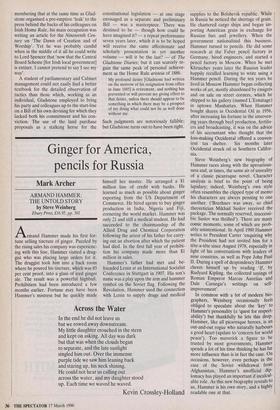Ginger for America, pencils for Russia
Mark Archer
ARMAND HAMMER: THE UNTOLD STORY by Steve Weinberg
Ebury Press, f16.95, pp. 501
Armand Hammer made his first for- tune selling tincture of ginger. Puzzled by the rising sales his company was experienc- ing with this line, Hammer visited a drug- gist who was placing large orders for it. The druggist took him into a back room where he poured his tincture, which was 85 per cent proof, into a glass of iced ginger ale. The result was a powerful highball. Prohibition had been introduced a few months earlier. Fortune may have been Hammer's mistress but he quickly made himself her master. He arranged a $1 million line of credit with banks. He learned as much as possible about ginger exporting from the US Department of Commerce. He hired agents to buy ginger production in India, Nigeria and Fiji, cornering the world market. Hammer was only 21 and still a medical student. He had succeeded to the chairmanship of the Allied Drug and Chemical Corporation following the arrest of his father for carry- ing out an abortion after which the patient had died. In the first full year of prohibi- tion his company made more than $1 million in sales.
Hammer's father had met and be- friended Lenin at an International Socialist Conference in Stuttgart in 1907. His son's name was a play upon the arm and hammer symbol on the Soviet flag. Following the Revolution, Hammer used the connection with Lenin to supply drugs and medical
supplies to the Bolshevik republic. While I in Russia he noticed the shortage of grain. He chartered cargo ships and began im- porting American grain in exchange for Russian furs and jewellery. When the government nationalised this business, Hammer turned to pencils. He did some research at the Faber pencil factory in Germany, hired engineers, and started a pencil factory in Moscow. When he met Khruschev years later the Russian leader happily recalled learning to write using a Hammer pencil. During the ten years he lived in Moscow Hammer began collecting works of art, mostly abandoned by emigres and on sale on street corners, which he shipped to his gallery (named L'Ermitage) in uptown Manhattan. When Hammer bought shares in Occidental Oil in 1956, after increasing his fortune in the interven- ing years through beef production, fertilis- ers and broadcasting, it was on the advice of his accountant who thought that the loss-making Occidental offered a conven- ient tax shelter. Six months later Occidental struck oil in Southern Califor- nia.
Steve Weinberg's new biography of Hammer races along with the uproarious- ness and, at times, the same air of unreality of a classic picaresque novel. Character analysis is brief to the point of being lapidary; indeed, Weinberg's own style often resembles the clipped type of memo his characters are always penning to one another. (`Brezhnev was away, so chief theoretician Mikhail Suslov received the package. The normally reserved, inaccessi- ble Suslov was thrilled'). There are many comic moments, some of which are prob- ably unintentional. In April 1980 Hammer writes to President Carter 'enquiring why the President had not invited him for a tete-a-tete since August 1978, especially in light of his conversations with leaders of nine countries, as well as Pope John Paul II. During a spell of despondency Hammer cheers himself up by reading 'If, by Rudyard Kipling, the collected sayings of Roman Emperor Marcus Aurelius and Dale Carnegie's writings on self- improvement'.
In common with a lot of modern bio- graphers, Weinberg occasionally feels obliged to speculate about the 'key' to Hammer's personality (a 'quest for respect- ability') but thankfully he lets this drop. Hammer, like all picaresque heroes, is an out-and-out rogue who naturally harbours a good heart (update to 'concern for world peace'). Too maverick a figure to be trusted by most governments, Hammer spends a lot of his time thinking he has far more influence than is in fact the case. On occasions, however, even perhaps in the case of the Soviet withdrawal from Afghanistan, Hammer's unofficial dip- lomacy has played an important if incalcul- able role. As this new biography reveals to us, Hammer is his own story, and a highly readable one at that.


























































 Previous page
Previous page